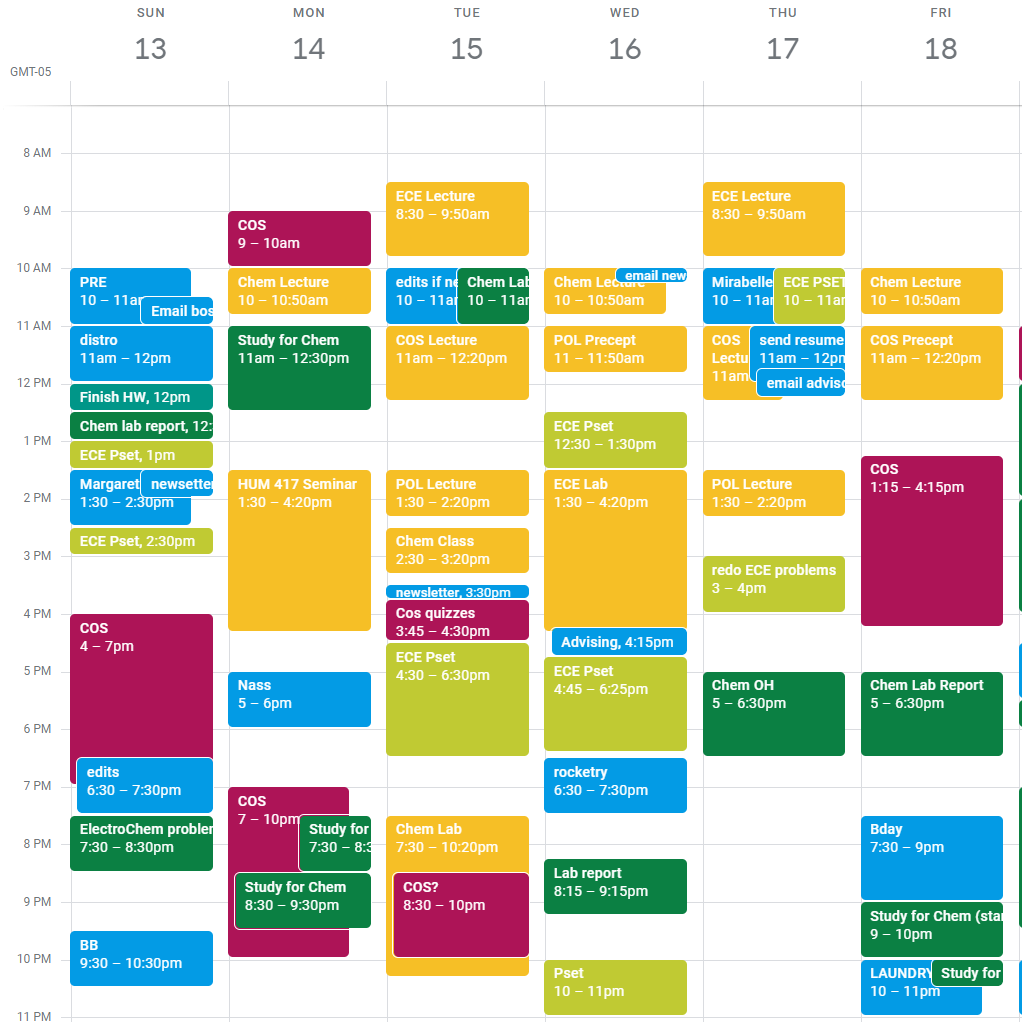While reading Ryan’s recent post about dean’s date traditions and reading period excitement, I started thinking back to all of the things I wish I did differently during my first reading period. Today, I want to approach the same topic of reading period, but from a slightly less exciting (although necessary) angle: how to actually buckle down and stay productive when studying for finals. Unlike fall finals last year, reading period this December will be fully on campus, and for most of us, won’t require navigating studying from home. Here’s some of my advice for how to take full advantage of reading period for a strong end to the semester.

- Leave your room!
This first tip is one that I should put into practice more myself. As tempting as it can be to tell myself that it will be more convenient to study in my dorm, I find that I am far more productive when I force myself to find a dedicated study spot. For a lot of students, that will mean going to Firestone or another library. Firestone can get crowded during reading period, however (and if you live in Forbes like me, it can be a long walk to make in the chilly weather). The good news is that there are plenty of alternatives: try finding an empty classroom, a cozy chair in a common room, or even an empty seat in the closest dining hall between meals. It’s worth noting that if you do walk all the way up campus, you may be more likely to stay there and work for longer instead of going back to your room.
- Don’t just plan out your time on a calendar, but set timers.
By now, you’ve probably met one of the many Princeton students who block out every minute of their day in Google Calendar. While I personally like to stick to putting just my classes and other scheduled activities in my calendar, I find that during reading period, it can be really helpful to block out your time more specifically. My roommate Anya likes to call this “optimizing your schedule.” This strategy not only helps me to get an idea of how to balance the time spent studying for multiple exams at once, but also forces me to hold myself a little more accountable when it comes to taking breaks. When you finally manage to get in the zone, it can be hard to find a good point to stop, no matter how much you could probably use it. For this reason, I like to set timers – both as I’m trying to get out the door to go to the library, and also once I get there, so I can remind myself when it is a good point to stop. Another way of incorporating timers can be by using the Pomodoro method. I really enjoy this strategy for tasks where I’m having particular trouble focusing because it is structured around breaking up big tasks by ensuring your brain will have short, periodic breaks.
- Turn both your studying and study breaks into specific activities
Instead of just blocking out a few hours of “study for anthropology” on your calendar in the afternoon, come up with ways to hold yourself accountable by making your study plans more specific. A great way to do this is to organize study groups, and come up with set times to review together for a shared class. Even if you don’t know anyone in your class, however, you can still organize group study sessions where you all work independently on your own assignments. If you need to study alone, try coming up with a more specific task that you will spend each chunk of time on; “study for anthropology” can easily become “compile main points from anthropology lecture notes” or “review anthropology readings.” I find that the more specific my plan is, the easier it is to convince myself that I actually need to stick to it when the time to start actually rolls around.
I also like to come up with specific study breaks to give myself something to look forward to. I am far more likely to leave my dorm a little earlier than usual if I know that later in the day I have plans to get coffee with a friend. Personally, I find that I am very food-motivated, so my study breaks usually revolve around snacks. Other motivators can work too, however. I will never deprive myself of a treat if I’m hungry, but I do think it’s ok to skip watching tv and exclusively treat it as a reward when I really need to get work done. One of my favorite strategies to read a painfully dry textbook is to let myself watch a 30-minute episode of my choice after each chapter. Reward systems like these help me to trick my brain into associating otherwise difficult tasks with some of my favorite pastimes. It may sound a little intense, but most of my friends have expressed that they don’t have time to watch tv or read books for fun at Princeton anyway. I find that I usually end up getting to cross more of my to-watch or to-read list than I would otherwise!
Best of luck this finals period. Don’t go too hard on yourself – college is a time to figure out how you study best. Experimenting with different methods is a great place to start.
— Kate Weseley-Jones, Humanities Correspondent

